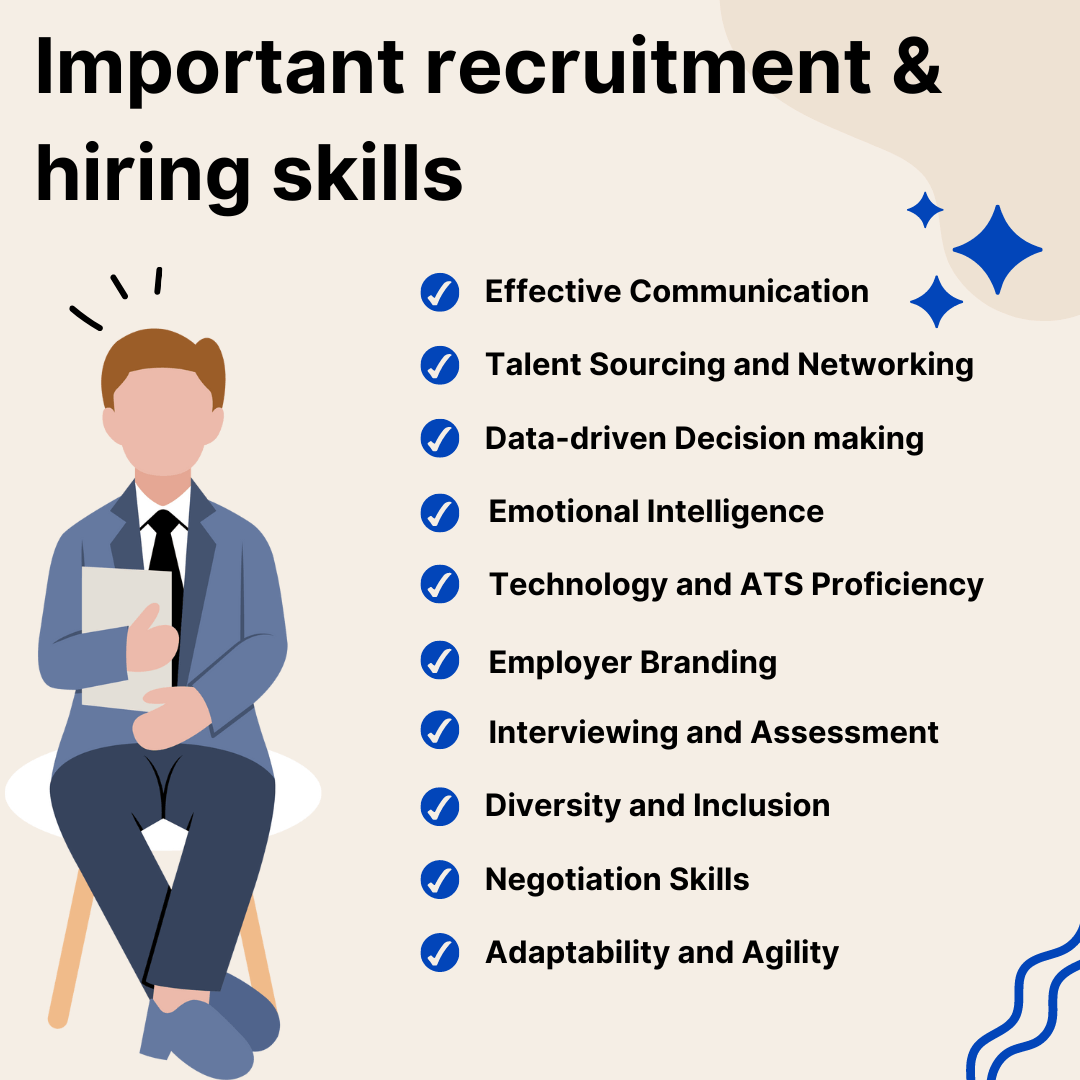
One famous quote from Steve Jobs is “Hiring the best is the most important task.”
Anybody in the recruitment space would more than agree with what he said. Today’s job market is very competitive and attracting top talents is not possible with just a few job postings and scheduling interviews. (as it once used to be).
Recruitment specialists have a crucial role in identifying, engaging, and securing the right candidates for their organizations, which is not an easy task at all.
If you’re looking to start your career in recruitment in 2023 or want to get to the next level? Master these 10 recruitment skills shared by our recruiting managers and experts.
TL;DR

1. Effective Communication
Why it matters for recruiters:
Clear and concise communication is crucial for building relationships with candidates, gaining their trust, and effectively conveying job requirements and expectations. It helps recruiters establish a positive candidate experience and ensures mutual understanding throughout the hiring process.
How recruiters can get better at it:
To enhance communication skills, recruiters can engage in activities such as active listening, practicing empathy, and adapting their communication style to suit different candidates.
They can also seek professional development resources such as communication skills training programs, industry publications, or online forums where they can learn from experienced recruiters and industry experts. Building strong communication skills will help recruiters effectively engage with candidates and create a positive recruitment experience.
2. Talent Sourcing and Networking
Why it matters for recruiters:
Effective talent sourcing and networking are essential for recruiters to tap into a wider pool of qualified candidates and improve recruitment outcomes. Building a strong network helps recruiters access passive candidates, receive referrals, and stay connected with industry trends and insights.
How recruiters can get better at it:
Recruiters can enhance their talent sourcing and networking skills by leveraging various resources and strategies. They can explore online job boards, professional networking platforms, and industry-specific communities to identify potential candidates. Attending industry events and conferences provides opportunities for networking and establishing connections with professionals in the field.
Staying updated on the latest sourcing techniques and utilizing social media platforms effectively can also contribute to successful talent acquisition. Continuous learning and candidate engagement in networking activities will help recruiters expand their candidate pool and improve their overall recruitment efforts.
3. Data-driven Decision Making
Why it matters for recruiters:
Data-driven decision-making empowers recruiters to make informed choices, refine hiring strategies, and optimize the recruitment process. By analyzing relevant metrics and insights, recruiters can identify patterns, trends, and areas for improvement, leading to more effective talent acquisition.
How recruiters can get better at it:
Recruiters can enhance their data-driven decision-making skills by leveraging various resources and tools. WebPipl’s analytics and reporting capabilities provide valuable insights into recruitment data. Recruiters should familiarize themselves with key recruitment metrics and performance indicators to understand the impact of their decisions.
Staying updated on industry trends, attending webinars or conferences on data-driven recruitment, and seeking out best practices will further develop their ability to leverage data for better hiring outcomes.
Related: find out how top tech companies using AI in their recruitment process
4. Emotional Intelligence
Why it matters for recruiters:
Emotional intelligence plays a critical role in creating positive candidate experiences and building a strong employer brand. Recruiters with high emotional intelligence can understand and empathize with candidates’ emotions and needs, leading to more meaningful connections and improved outcomes.
How recruiters can get better at it:
Recruiters can enhance their emotional intelligence by actively developing their interpersonal skills. Attending workshops or webinars focused on emotional intelligence can provide valuable insights and techniques. Practicing active listening, empathy, and effective communication are essential in building emotional intelligence.
Additionally, utilizing candidate feedback tools, such as surveys or interviews, can provide valuable insights into candidate experiences and help recruiters identify areas for improvement.
5. Technology and ATS Proficiency
Why Technology and ATS Proficiency matters for recruiters:
In today’s digital age of recruiting, recruiters who are proficient in recruitment technology and applicant tracking systems (ATS) gain a competitive edge. Technology proficiency streamlines the hiring process, improves candidate management, and enhances overall productivity.
How recruiters can get better at Technology and ATS Proficiency:
To improve technology and ATS proficiency, recruiters can leverage a variety of resources. WebPipl’s myATS features provide a comprehensive platform for recruiters to enhance their skills and familiarity with recruitment technology.
Additionally, taking advantage of training resources, tutorials, and online courses specific to ATS platforms can help recruiters stay up to date with the latest features and best practices. By continuously learning and adapting to evolving technology, recruiters can optimize their recruitment processes and achieve better outcomes.
6. Employer Branding
Why it matters for recruiters:
Building a strong employer brand is essential for attracting top talent and creating a positive candidate experience. It establishes your organization as an employer of choice, enhances candidate engagement, and improves the overall recruitment process.
How recruiters can get better at it:
To strengthen employer branding, recruiters can utilize various strategies. While WebPipl’s employer branding tools provide valuable resources, recruiters can also showcase company culture and values through compelling job descriptions, engaging career pages, and authentic employee testimonials.
Collaboration with marketing teams can help align recruitment efforts with the overall brand messaging. Additionally, active engagement with candidates on social media platforms creates opportunities to showcase the organization’s unique qualities and engage with potential candidates. By consistently promoting a strong employer brand, recruiters can attract top talent and enhance overall recruitment success.
7. Interviewing and Assessment
Why it matters for recruiters:
Mastering effective interviewing and assessment techniques is crucial for identifying the right candidates who align with the organization’s goals, culture, and job requirements. It ensures a thorough evaluation process and increases the chances of successful candidate selection.
How recruiters can get better at it:
To improve interviewing and assessment skills, recruiters can explore various resources and strategies. Stay updated on industry best practices and the latest trends in interviewing techniques through industry publications, professional forums, and webinars. Seek feedback from hiring managers and colleagues to gain insights and refine your approach.
Additionally, utilize tools and platforms that facilitate interview scheduling and assessment, ensuring a structured and efficient process. By continuously enhancing your interviewing and assessment abilities, you can make more informed hiring decisions and select candidates who are the best fit for your organization.
Learn how you can improve your recruiting workflow using iAssess, an online skill assessment tool.
8. Diversity and Inclusion
Why it matters for recruiters:
Prioritizing diversity and inclusion in the recruitment process leads to a more inclusive and innovative workforce, strengthens the company’s employer brand, and fosters a positive and supportive company culture.
How recruiters can get better at it:
To improve diversity and inclusion efforts, recruiters can take several steps. Stay educated on diversity and inclusion initiatives, research best practices, and understand the importance of diverse perspectives in the workplace. Use inclusive language in job postings to attract a diverse pool of candidates.
Collaborate with diversity and inclusion teams or employee resource groups within the organization to gain insights and guidance. Additionally, explore diversity sourcing strategies and platforms that help identify diverse talent. By actively promoting diversity and inclusion, recruiters can contribute to building a more equitable and diverse workforce.
9. Negotiation Skills
Why it matter for recruiters:
Having strong negotiation skills is essential for recruiters to secure top talent and ensure fair and competitive compensation packages that align with both the candidate’s expectations and the organization’s budget.
How recruiters can get better at it:
To enhance negotiation skills, recruiters can take proactive steps. Attend negotiation workshops or webinars to learn effective strategies and techniques. Familiarize themselves with market trends and salary benchmarks to make informed and competitive offers. Engage in role-playing exercises to practice negotiation scenarios and develop confidence in handling different situations.
Additionally, seeking feedback from experienced recruiters or mentors can provide valuable insights and guidance for improvement. By continuously honing their negotiation skills, recruiters can maximize their ability to attract and retain top talent in a competitive AI-based hiring landscape.
10. Adaptability and Agility
Why it matters for recruiters:
In the fast-paced and ever-evolving field of recruitment, being adaptable and agile is crucial. It enables recruiters to navigate changing circumstances, adjust recruitment strategies based on market demands, and embrace new technologies and methodologies to stay ahead.
How recruiters can get better at it:
To enhance adaptability and agility, recruiters can take proactive steps. Embrace a mindset of continuous learning by staying updated on industry trends, attending webinars or conferences, and reading relevant publications. Seek feedback from hiring managers, candidates, and peers to learn from past experiences and identify areas for improvement.
Explore new recruitment tools and technologies that can streamline processes and enhance efficiency. By staying flexible, open-minded, and willing to embrace change, recruiters can thrive in the dynamic and competitive recruitment landscape.
What does a recruitment specialist do?
A recruitment specialist is responsible for managing the end-to-end recruitment process. It can include right from sourcing and attracting candidates to evaluating their qualifications and facilitating the hiring process. They work closely with hiring managers and HR teams to understand the organization’s staffing needs, develop effective recruitment strategies, and create job descriptions.
Here are the vital Role and Responsibilities of a recruitment specialist.
- Managing the end-to-end recruitment process.
- Sourcing and attracting candidates.
- Evaluating qualifications and facilitating hiring.
1. Collaboration and Strategy
- Working closely with hiring managers and HR teams.
- Understanding staffing needs.
- Developing effective recruitment strategies.
- Creating job descriptions.
2. Candidate Sourcing
- Utilizing various methods to source candidates.
- Using job boards, social media, and networking.
Find the top candidate sourcing tools for hiring and recruiting.
3. Candidate Evaluation
- Screening resumes.
- Conducting interviews.
- Assessing candidates’ skills and qualifications.
4. Offer Negotiation and Onboarding
- Negotiating job offers.
- Coordinating onboarding activities.
5. Relationship Management
- Maintaining relationships with candidates.
- Collaborating with external recruitment agencies.
What is the role of an HR recruiter?
An HR recruiter collaborate with hiring managers to understand the staffing needs and requirements for various positions within the company. HR recruiters utilize various sourcing methods, such as job boards, social media, and referrals, to attract qualified candidates.
They review resumes, conduct initial screenings, and coordinate interviews with hiring managers.
How to practice and improve your recruitment skills?
To practice and improve your recruitment skills, stay updated on talent acquisition industry trends, seek feedback from hiring managers and candidates, and engage in role-playing exercises to enhance your communication and interviewing abilities.
Continuously invest in your professional development through courses and certifications tailored to recruitment.
Here are some tips to improve your recruiting skills:
Tips to Improve your recruitment skills
- Stay updated on industry trends.
- Seek feedback from hiring managers and candidates.
- Engage in role-playing exercises for better communication and interviewing abilities.
- Invest in professional development through courses and certifications.
- Utilize technology, such as WebPipl’s features, to streamline processes.
- Network with fellow recruiters and professionals.
- Attend industry events to expand your knowledge.
- Reflect on your performance regularly to identify areas for improvement.
- Embrace continuous learning and adaptability.
- Challenge yourself and embrace new techniques to stay ahead in recruitment.
Continuously challenge yourself, embrace new techniques, and adapt to the evolving needs of the industry to become a more effective and successful recruiter.
How do recruiters find candidates?
Here’s a step-by-step process on how recruiters find candidates, with the solution of using our product integrated into the steps:
Step 1. Define Job Requirements
Recruiters begin by understanding the job requirements and skills needed for the role.
Source Candidates: Source Candidates: Recruiters employ various sourcing strategies such as online job boards, social media platforms, and professional networks to find potential candidates. They can also utilize advanced candidate sourcing tools to analyze candidates’ profiles and identify suitable matches.
Step 2. Review Resumes
Recruiters review resumes and shortlist candidates based on their qualifications and experience. Automated resume screening tools can assist in efficiently filtering and evaluating candidates.
Step 3. Conduct Interviews
Recruiters schedule and conduct interviews to assess candidates’ skills, cultural fit, and potential. Video interviews and collaborative evaluation tools can enhance the interview process.
Discover the best video interviewing tools for recruiters and hiring managers.
Step 4. Evaluate Candidates
Recruiters evaluate candidates based on their performance in interviews, reference checks, and assessments. Candidate assessment tools provide objective evaluation measures.
Step 5. Select and Onboard
Recruiters select the most suitable candidate and proceed with the onboarding process to welcome them into the organization. Streamlined onboarding platforms simplify the transition for a seamless experience.
By following this step-by-step process, recruiters can efficiently find and select top candidates, utilizing the comprehensive features of WebPipl’s recruitment suite to enhance their sourcing and hiring capabilities.
How recruiters can use video interviews to find top talents faster?
Recruiters can leverage video interviews to find top talents faster by conducting remote interviews that save time and streamline the hiring process. With video interviews, recruiters can easily connect with candidates from anywhere, eliminating the need for travel. This allows for efficient screening of a larger pool of candidates and faster identification of the most qualified individuals.
With iVerified, world’s fastest video interviewing platform, recruiters can seamlessly connect with candidates from any location, eliminating the need for travel and saving valuable time. iVerified offers a user-friendly interface for conducting video interviews, allowing recruiters to efficiently assess candidates’ communication skills, demeanor, and cultural fit.
With iVerified’s advanced features and secure platform, recruiters can confidently streamline their hiring process and make well-informed decisions, ultimately finding the best candidates faster and with greater convenience.
Additionally, video interviews provide a glimpse into candidates’ communication skills, demeanor, and cultural fit early in the process.

Raju Thammala is the founder of WebPipl, an AI-based recruitment company revolutionizing the tech hiring process with products like video interviews, ATS software, etc.
As CEO and founder, Raju Thammala is passionate about leveraging technology to deliver next-gen recruiting services. In his free time, Raju enjoys reading and exploring new cuisines or jet-setting to exotic destinations.
